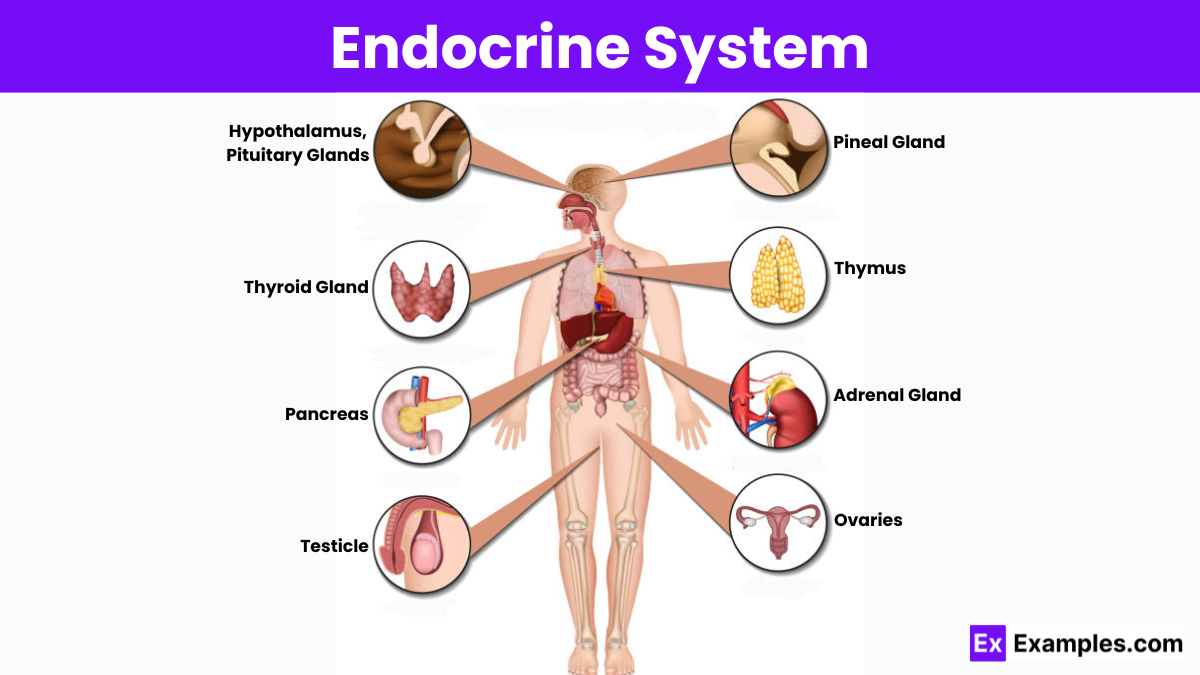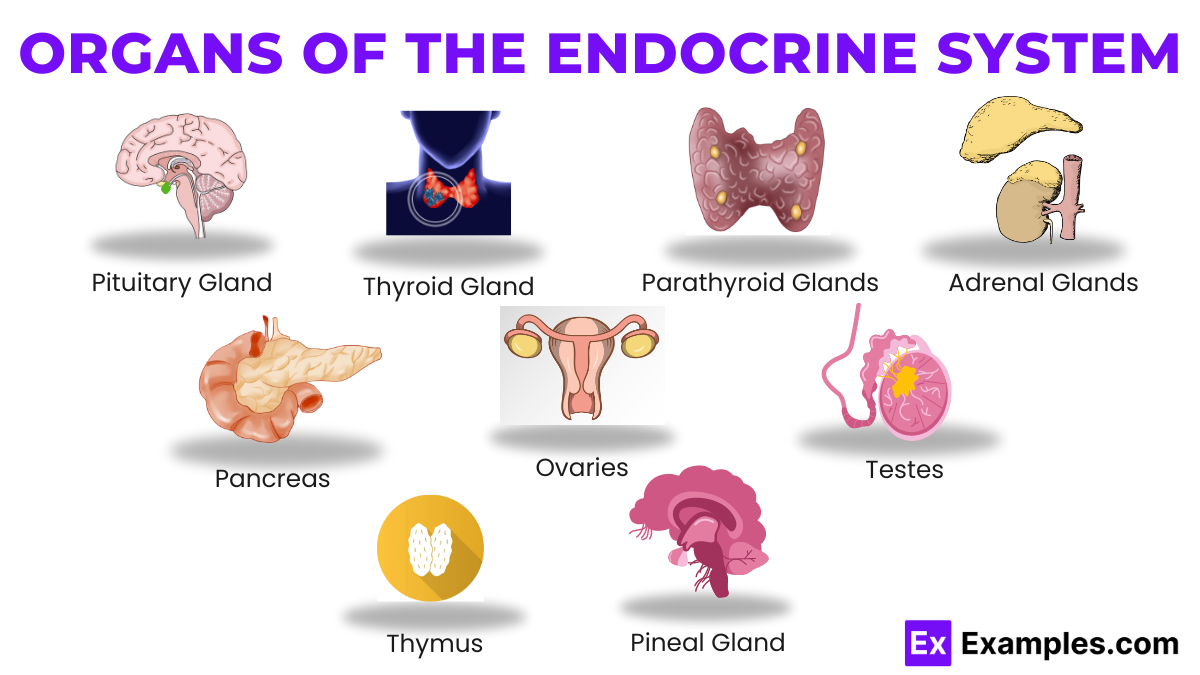What is the primary function of the endocrine system?
To regulate body temperature
To produce and secrete hormones
To control voluntary movements
To protect against pathogens


The endocrine system is a network of glands that regulate body functions by secreting hormones. Key components include the pituitary, thyroid, and adrenal glands, along with hormone-producing areas in the pancreas, ovaries, and testes. This system works closely with the nervous system, forming the neuroendocrine system, which maintains the body’s balance through the hormone-regulating actions of the hypothalamus and pituitary gland, essential for homeostasis.
The endocrine system is a network of glands that produce hormones. These hormones are chemical messengers that control many body functions. They travel through the bloodstream to organs and tissues, guiding processes like growth, metabolism, and mood.
This system includes key glands like the pituitary, thyroid, adrenal, and pancreas. Each gland releases specific hormones that target certain parts of the body. This helps keep the body in balance and maintains health.
The endocrine system plays a pivotal role in maintaining the body’s internal environment by releasing hormones into the bloodstream. These hormones, numbering over fifty types, are crucial in regulating nearly every physiological aspect of your health. They achieve their effects by binding to specific target cells and initiating necessary changes within those cells
The presence of too much or too little of any hormone can lead to significant health issues, often marked by distinct symptoms. Thus, the endocrine system not only facilitates crucial bodily functions but also continually monitors and adjusts hormone levels to maintain balance and well-being.
The endocrine system is a complex network of glands and organs that produce hormones. These hormones regulate essential functions throughout the body. Here’s a closer look at the main components of the endocrine system

The endocrine system comprises various glands that secrete hormones directly into the bloodstream. These hormones regulate numerous bodily functions, ensuring proper growth, metabolism, and homeostasis. Here’s an overview of the primary organs within the endocrine system and their functions:
Located at the base of the brain, the pituitary gland is often termed the “master gland” because it controls other endocrine glands and regulates several body functions. It secretes hormones that influence growth, reproduction, and metabolism.
Situated in the neck, the thyroid gland produces hormones that regulate the body’s metabolic rate, heart function, digestive function, muscle control, brain development, and bone maintenance.
These small glands are located behind the thyroid gland and are crucial in regulating the body’s calcium levels, which are vital for functioning of the nervous system, muscles, and bones.
Found atop each kidney, the adrenal glands produce hormones that help regulate metabolism, immune system, blood pressure, response to stress, and other essential functions.
This gland functions as both an endocrine and exocrine gland. As part of the endocrine system, it produces insulin and glucagon, which regulate blood sugar levels.
In females, the ovaries produce hormones like estrogen and progesterone, which are crucial for reproductive health, regulating menstrual cycles, and supporting pregnancy.
In males, the testes produce testosterone, which influences male sexual development, promotes muscle strength, and maintains libido.
Located in the brain, the pineal gland produces melatonin, which affects sleep patterns and seasonal biological rhythms.
Situated in the upper chest beneath the breastbone, the thymus is active until puberty and produces hormones important for the development of the immune system.
The endocrine system, essential for coordinating various body functions, comprises several major glands. These include the hypothalamus, which links the nervous system to the endocrine system via the pituitary gland; the pituitary gland, known as the master gland because it controls other endocrine glands; the thyroid gland, which regulates metabolism; the parathyroids, which maintain calcium levels; the adrenal glands, involved in stress responses; the pineal gland, which helps regulate sleep patterns; and the reproductive glands, which include the ovaries in females and the testes in males. Each of these glands secretes hormones directly into the bloodstream, playing a crucial role in maintaining homeostasis.
The endocrine system is a network of glands that produce and release hormones that help control many important body functions, including the body’s ability to change calories into energy that powers cells and organs. Below is a detailed overview of the major endocrine glands and the hormones they produce.
Located at the base of the brain, the pituitary gland is often dubbed the “master gland” because its hormones regulate other endocrine glands. It produces several hormones including:
Located in the front part of the neck, the thyroid gland produces hormones that regulate the body’s metabolic rate as well as heart and digestive function. Hormones include:
These are small glands in the neck that produce parathyroid hormone (PTH).
Located above the kidneys, these glands produce hormones that help regulate metabolism, immune system, blood pressure, and other essential functions.
An organ located in the abdomen, it plays an essential role in digestion and in regulating blood sugar.
In females, the ovaries secrete hormones that influence female sexual development and reproduction.
In males, the testes produce testosterone, which is responsible for male sexual development and reproduction.
Located in the brain, this gland secretes melatonin.
Endocrine glands are vital components of the endocrine system, responsible for secreting hormones directly into the bloodstream. These hormones regulate various body functions such as growth, metabolism, and mood. Key endocrine glands include the pituitary, thyroid, adrenal, and pancreas, each producing specific hormones like growth hormone, thyroxine, adrenaline, and insulin, respectively. By releasing these hormones, endocrine glands play a crucial role in maintaining homeostasis and facilitating intercellular communication throughout the body.
The endocrine system, consisting of various glands that produce hormones, is crucial for maintaining bodily functions. However, it is susceptible to a range of disorders that can significantly affect health and well-being. Below is an overview of common diseases of the endocrine system:
This is perhaps the most well-known endocrine disorder. It occurs when the pancreas does not produce enough insulin (Type 1 diabetes) or the body cannot effectively use the insulin it produces (Type 2 diabetes). This leads to elevated blood glucose levels, which can cause various health issues over time, including heart disease, kidney failure, and nerve damage.
Thyroid disorders arise from the production of too much or too little thyroid hormone.
This occurs when the body is exposed to high levels of cortisol for a long time. Common causes include prolonged use of corticosteroid medication and tumors that produce adrenocorticotropic hormone (ACTH). Symptoms often include weight gain, upper body obesity, severe fatigue, and high blood pressure.
This is characterized by insufficient production of hormones by the adrenal glands, including cortisol and aldosterone. Symptoms may include fatigue, muscle weakness, weight loss, low blood pressure, and sometimes darkening of the skin.
A common hormonal disorder among women of reproductive age, PCOS is associated with a variety of symptoms including irregular menstrual periods, excessive hair growth, acne, and obesity. It can also lead to serious health issues such as insulin resistance, type 2 diabetes, high cholesterol, and heart disease.
These disorders are caused by an overproduction of growth hormone, usually due to a benign tumor of the pituitary gland. Gigantism occurs in children and results in excessive growth and height considerably above average. Acromegaly occurs in adults, causing enlargement of the extremities, including hands, feet, and face.
A rare disorder involving a decrease in one or more of the hormones produced by the pituitary gland. Symptoms depend on which hormones are affected and might include infertility, decreased sexual function, fatigue, and impaired growth.
These conditions are associated with imbalances in calcium levels, regulated by parathyroid hormone (PTH). Issues can include hyperparathyroidism (excessive PTH production) leading to high calcium levels and associated bone weakening, and hypoparathyroidism (insufficient PTH production) resulting in low calcium levels and muscle cramps or spasms.
Endocrine glands secrete critical hormones like insulin, cortisol, thyroid hormones, and sex hormones, regulating bodily functions.
The seven key hormone-secreting glands are the pituitary, thyroid, parathyroid, adrenal, pancreas, ovaries (in females), and testes (in males).
The four major endocrine glands include the thyroid gland, adrenal glands, pancreas, and pituitary gland.
Endocrine glands secrete hormones directly into the bloodstream to regulate various body functions.
The secretion of the endocrine glands, known as hormones, plays a crucial role in regulating bodily processes.
Text prompt
Add Tone
10 Examples of Public speaking
20 Examples of Gas lighting
What is the primary function of the endocrine system?
To regulate body temperature
To produce and secrete hormones
To control voluntary movements
To protect against pathogens
Which gland is known as the "master gland" of the endocrine system?
Thyroid gland
Adrenal gland
Pituitary gland
Pancreas
What hormone is produced by the thyroid gland?
Insulin
Cortisol
Thyroxine
Adrenaline
Which hormone is primarily responsible for regulating blood sugar levels?
Estrogen
Testosterone
Insulin
Progesterone
Which gland is often referred to as the "master gland" of the endocrine system?
Thyroid gland
Pituitary gland
Adrenal gland
Pancreas
Which hormone is primarily produced by the thyroid gland?
Insulin
Thyroxine
Adrenaline
Estrogen
What role does the adrenal gland play in the body?
Regulation of blood sugar
Control of stress response
Production of sex hormones
Regulation of body temperature
Which hormone is produced by the pancreas and regulates blood glucose levels?
Glucagon
Cortisol
Thyroxine
Growth hormone
Which gland is responsible for the development of secondary sexual characteristics during puberty?
Pineal gland
Pituitary gland
Gonads
Thyroid gland
What is the function of the pituitary hormone known as oxytocin?
Regulation of metabolism
Inducing labor during childbirth
Regulation of blood sugar
Stimulating growth
Before you leave, take our quick quiz to enhance your learning!

